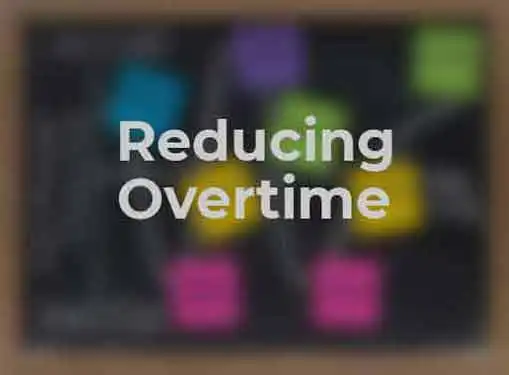Operations Management
Reducing Overtime
Written by Andrew Goldman for Gaebler Ventures
Using a lot of overtime can be a costly way to run your business. Reducing overtime requires improvements to your Operation and good management skills. Employees who are accustomed to receiving overtime checks can be weary when you take it away.
Reducing overtime can be tricky business.

While it makes sense that we should aim to reduce our overtime due to the added cost to our company, many employees become used to overtime and consider it part of their salary.
As your company becomes more efficient, you will need to reduce overtime in order to maximize your profits. The effort to reduce overtime can be met with grumbles from your workforce if they have become accustomed to the added dollars.
Clearly, if you are using a lot of overtime, you are not operating as efficiently as possible. Using overtime is the quickest and easiest way to meet demand that exceeds capacity, but if it is being used on a consistent basis then there are deeper problems within your company.
If your demand is consistently exceeding capacity, it may be time to increase capacity by purchasing additional equipment or hiring additional workers. Before making this jump, you should attempt to improve your efficiency by reducing bottlenecks and eliminating waste. If you can make major strides in these areas, you may be able to reduce your lead time and become capable of meeting your demand without using overtime or increasing your capacity.
When you begin to take measures to eliminate overtime, either by improving efficiency or increasing capacity, you need to understand the effect this will have on your workforce. If overtime has become part of your company culture, your employees are probably used to the extra money in their paycheck. When you eliminate this extra money, your employees are naturally going to be upset. They may view it as a pay cut. It's important to address your employees' concerns before making the jump to reduce overtime.
There is no clear cut way on how to deal with your employees in this regard, as it depends on your particular workforce and your company. In general, your employees are one of your most valuable assets and you want to treat them with respect and retain them. As a result, you should address the issue with honesty and explain why the change is being made. By being honest with your employees, you eliminate any feelings of deceit and your employees will appreciate it.
Since you are going to save money by reducing overtime, you may want to offer slight raises to your employees to offset their perceived reduction in pay. This raise should be less than the money you will save in overtime. If you choose this route, you should compile data and do a thorough analysis on the expected costs.
If your overtime is inconsistent, you may not have to take extreme measures to eliminate it, but you should be aware of when overtime occurs and try to identify the causes. Overtime is costly and can mean the difference between a profitable week and a losing week. By improving your overall efficiency and eliminating waste in your operation, you should be able to reduce the overtime in your company.
Remember the effect overtime has on your employees and address their concerns. By eliminating overtime your company will become more profitable and efficient.
Andrew Goldman is an Isenberg School of Management MBA student at the University of Massachusetts Amherst. He has extensive experience working with small businesses on a consulting basis.
Share this article
Additional Resources for Entrepreneurs

Hi Mohammed. Greetings from Chicago! Regarding how to reduce overtime, I think you probably realize that if you went to three shifts at eight hours each, you could have the same amount of work done and not pay any overtime.
The challenges will be: 1) you have to increase the size of your workforce by 50% and it may be difficult and expensive to do that; 2) workers may be very upset that their total wages have gone down (so you may have a mutiny on your hands); and 3) there may be some constraints, physical or otherwise, that prevent you from running a third shift.
There's some middle ground you can chase after. As you can see in the image below, you can gradually hire additional workers to reduce overtime. If adding workers works for you, you don't even have to add a third shift; you can just increase the number of people on your current shifts.
Of course, I'm guessing that the above solution is not viable for you, or else you would be pursuing it. There are other options, of course. For example, if you can subcontract some of the work, or move any of your work out of Qatar, you could reduce your overtime expenses. And, of course, any productivity gains you can achieve would reduce overtime costs.
Please let me know how things work out for you. What did you try and how well did it work?
For others who are working on overtime reduction, I would be curious to know if you agree with my logic above and what things you have tried at your company.